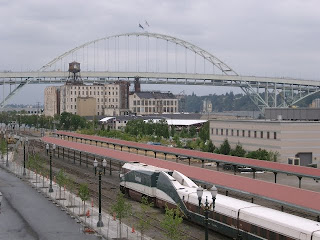Late last summer I had a 1:00 Friday meeting with a seed-stage venture fund in Vancouver, BC. By car it's about 110 miles up I-5 to the border crossing at Blaine, and another 30 miles further on BC Provincial highway 99.
It's a tedious drive. Scenery punctuates monotony infrequently.
I took the train instead. The timing works well--there's a 7:40 a.m. departure from Seattle's King Street station getting into Vancouver somewhat before noon. A pleasant bus ride for another $2.50 brought me within a block and a half of the downtown office for my meeting. Afterward, I visited an old friend over some Granville Island IPAs and was back to the station in time for the 5:45 back to Seattle. The beautiful evening provided pleasing views across the water towards Vancouver Island and the Olympic Peninsula, bathed in the soft sunset hues of an early autumn evening, and dotted with boaters seizing an early start to a long weekend laze. Outside the opposite windows was a dense metal caravan of single-occupant vehicles snailing their way out of town to the nightly bottleneck at the tunnel under the Fraser River.
After leaving the perfunctory stop at the border, the crew thoughtfully dimmed the lights in the lounge car, creating, well, the feeling of a languidly inviting lounge, lit only by the glow of low table lamps and my workhorse laptop screen.
There are now two trips a day between Seattle and Vancouver.
Some tell me that the train (or public transit in general) takes too long, and that cars are much faster, saving time. But that depends on what time you're saving. It's generally true that one can get from point A to B quicker by car (although this is not always a good bet if a border crossing is involved.) However, that time is spent driving, during which most other activities are not possible or at least not well-advised. Listen to the radio, think, and perhaps talking on the phone--sure. On the train I can relax, do a little work (like last minute tweaks of the PowerPoint deck), make phone calls, be mesmerized by the ample scenery, or even nap. Soon there will be WiFi. That's time saved!
Since trains don't do well with steep grades their tracks often follow naturally level contours, such as along shores, so the scenery is great. Last week I took the Amtrak Cascades to and from Portland; the stretch along Puget Sound is just beautiful. If you want a real treat, take the Coast Starlight all the way to Los Angeles.
The train saves money too. The gas is one thing, but when you figure in the mileage and recognize that it is a pro-rata proxy for tire wear, and depreciation of the capital cost of buying the car in the first place, the standard IRS rate of 50 cents a mile seems believable.
The biggest problem with trains is that they sometimes break down, or mudslides cover the tracks, or the line is closed for an accident investigation. More support for trains would help, as would building high speed trains with modern switching and dedicated rights-of-way. Federal support for this lower carbon form of transportation is a good start. Arguments against trains, often from so-called think tanks funded by fossil fuel interests, are easily debunked.








No comments:
Post a Comment